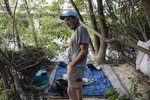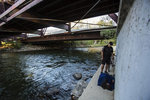

Mark Hennessy and Susan Pappas roll up their sleeping bags and hide them in the bushes. It's a dusty summer morning along the Boise River greenbelt, and it's legal for them to be here now. But if there's evidence they slept on the riverbank last night, they're in trouble.
Suddenly, they see a bike cop on his morning rounds. They try to look inconspicuous.
"What's up, guys?" says Boise police Sgt. Craig Nixon.
They say they're fishing; luckily, Hennessy has a rod. Pappas, at least, is safe from a criminal citation because the women's shelter was full. But Hennessy has been ticketed before, including recently for having a jar of pickles (no glass in public parks).
A few years ago, this conversation could have gone differently: Boise Police issued almost 300 citations for camping in a public place in 2015, but just 39 last year. Nixon let the couple go.
Things have changed here — and across the West — because of a lawsuit that started nearby. Seven homeless people took Boise to court, and a year ago this week, the U.S. Ninth Circuit Court of Appeals issued a landmark ruling. It said that if a city doesn't have enough shelter beds available, enforcing a camping ban like Boise's violates the constitutional ban on cruel and unusual punishment.
Boise is contesting the ruling, which could end up before the Supreme Court. But for now, the ruling has roiled politics and upended policies across the nine states in the Ninth Circuit's jurisdiction, from Arizona to Alaska.
Cities with little or no shelter have struggled to determine whether they'll be sued for enforcing anti-camping laws under the Robert Martin v. City of Boise ruling. Boise officials believe the city's hands are tied, said Theane Evangelis, whose high-powered law firm took the case for Boise for far below its usual rates.
"What we have as a result of the Ninth Circuit is effectively a constitutional right to camp in public places," Evangelis said.
Back in the mid-2000s, when the seeds of the lawsuit were sown, it was even tougher to be homeless in Boise, said Pam Hawkes, one of the few plaintiffs who is still alive and still homeless today.
"I'd be in the park and if they felt like I had a blanket or a piece of clothing too much on the ground, they considered me 'camping,'" Hawkes said. "They'd rouse me and make me pick everything up and move on and whatnot."
Her original lawyer, Howard Belodoff, said there's "no purpose" to that approach. "Why does Pam (Hawkes) have to take up a jail bed for criminals? To protect society? We don't need to protect society from people sleeping."
But it was this aggressiveness, combined with the fact that Boise didn't do much else to address homelessness, that led to the ruling, said Oskar Rey, a lawyer for Washington's Municipal Research and Services Center, who briefs municipal attorneys on adhering to Martin v. Boise.
"If all you're doing is enforcing criminal-code provisions against homeless individuals and you're not providing outreach or shelter space," Rey said, "you're essentially just pushing the problem to other jurisdictions."
One clear effect of Martin v. Boise: It's going to be a lot harder for cities to do that — unless the ruling is overturned.
The Ripple Effect
The nine states in the Ninth Circuit hold almost two-thirds of the country's unsheltered homeless — California alone holds almost half — and many cities in those states don't have enough shelter beds for them. In many cities, enforcement was put on hold as a result of the ruling.
The Honolulu City Council passed anti-camping laws only to have the police say they were unenforceable. In Lacey, Thurston County, the city passed anti-camping laws but acknowledged it couldn't enforce them until it opened a shelter. In Costa Mesa, California, the city waited to enforce the rules until it could open a 50-bed shelter at a church in April.
Seattle was largely unaffected because the city doesn't outright ban camping — it just restricts the time and place.
Other cities have found ways around the law. The Berkeley City Council backed away from a proposal to prohibit lying down and camping at a new public transit plaza downtown, but passed a law banning placement of "objects" that prevent use of "any portion" of sidewalks — a change advocates say was against the spirit of the ruling.
In Anchorage, Democrats in the state legislature told the mayor to clean up camps in the parks because there were other places outside for people to sleep.
"So long as Anchorage has some place individuals can sleep outside, case law does not limit removal of waste ... left by drug addicts, thieves, and other squatters/campers," said the letter.
The gate closed somewhat dramatically in Olympia. Olympia's downtown homeless population had grown to 300 over the summer of 2018, and the city was planning what would've been one of its largest sweeps ever. But on the eve of the removal, the city attorney told Keith Stahley, the city's community planning director, about the ruling.
"So we said, 'Put the brakes on and back to the drawing board; what do we do?'" Stahley said.
Months later, Olympia opened a sanctioned homeless camp downtown — comprising over 100 city-issued gray and green tents in neat rows — similar to the tent cities Seattle opened. Olympia enacted some rules, made sure there were beds at the local Union Gospel Mission and began enforcing anti-camping laws again.
Boise's Response
Olympia is not the only city to put up some infrastructure in response to the decision: Boise recently opened its first "housing first" complex where repeat offenders have managed to stay off the streets, according to Nixon. Although the facility opened after the decision came down, the planning began before.
But Boise officials say they still need to go to the Supreme Court, so they can prevent big camps like those in Seattle and Portland. Having a law on the books that says no camping, any time, is important for that, said a spokesperson for the mayor.
Belodoff, associate director of Idaho Legal Aid Services and a well-known Boise civil-rights lawyer, says there are other ways to enforce the law that prevent encampments but don't involve arresting people for sleeping.
That's the tension at the heart of Martin v. Boise: Where does an officer's ability to say "move along" cross the line into criminalizing someone for being homeless?
In Washington state, this was tested when Democrats in the state Legislature introduced a bill this year that, building on the decision, would have shifted the burden of proof for viable alternatives to sleeping outside. Instead of a homeless person having to prove that there was no shelter space, the city would have to prove there was.
But the bill itself raised big questions, according to state Rep. Nicole Macri, D-Seattle, who works in a shelter herself and was a co-sponsor.
"What does it mean if you can't ask people to move along?" said Macri. "If someone is in a public building and you need to close that building for the night... can you ask people to leave if they have no option of where to go?"
The bill didn't make it to the House floor.
Homeless Life in Boise Today
The evening of the day they ran into Sgt. Craig Nixon, Hennessy and Pappas were getting ready for another night in another camp along the river. Every day, they get up together, go for coffee at the shelter in town and in the hot afternoons, go swimming.
They avoid shelters because, they say, they don't want to be apart, and Boise doesn't have a couples' shelter. Hennessy and Pappas have known each other for more than 40 years, and they see each other as caretakers — he has diabetes, and she has a brain injury, Hennessy said.
"What remainder of time I've got on this planet, I want to be happy," Hennessy said. "I'm happy with her. Right now we're in a bad situation, but it'll change."